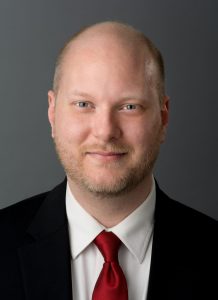As host and web producer of two new streaming channels on Classical Music Indy’s website, Andrew Martin found a sweet spot for his talents.
Words by Crystal Hammon
Martin wants to escort you to a musical place you’ve never gone before.
In the summer of 2019, Andrew Martin was randomly scrolling through job postings on the American Choral Directors Association website when he spotted a job as a web producer for Classical Music Indy (CMI). Martin landed the job, and by December, had helped CMI achieve one of its strategic goals: launching two classical music channels that stream 24/7 online.
The Lafayette, Indiana native’s primary passions are teaching and making live music with other musicians. But the role at CMI brings the former high school choral director at Lawrence North High School back to his broadcasting roots; it also ties all his interests into a neat knot. “To be able to expose people to music that they might not otherwise hear is such a great opportunity,” Martin says, referring to CMI’s mission for its two streaming channels.
One channel plays the rarely-aired music of living and modern composers. The other channel highlights conductors, composers, singers, and instrumentalists with a local connection — even if it’s only a temporary connection through a visiting artist. “It’s a really fun opportunity to merge my interests in music with my training and experience in broadcasting and music technology,” Martin says. “In some ways, classical music broadcasting, as opposed to Top 40 programming, is a teaching and educational activity.”
Landing on familiar turf
Martin has been involved with broadcasting since he was a student at Lafayette Jefferson High School. The school had a radio station and coursework that taught radio production. He liked it enough that he stayed in the curriculum, which gave him three years of radio production and announcing experience before graduation. After high school, Martin studied music education at Ball State University and earned pizza money working as a radio announcer and producer at Ball State University’s NPR-affiliated radio station.
While teaching at Lawrence North High School, the Lafayette native boosted his education with a master’s degree from IUPUI in music technology, a natural complement to the behind-the-scenes tasks at CMI. Martin recently pivoted toward teaching at the college level and returned to Ball State University for a doctorate in music.
As on-air announcer for CMI’s streaming channels, his doctoral studies were immediately relevant to choosing music and writing scripts that prepare Classical Music Indy listeners for what they’re about to hear. “It reminds me of some of the assignments I’ve done for my doctoral work,” he says. “Every semester, we’re asked to do a preconcert talk. We take half an hour to talk about what you are going to hear in a concert. It’s a specific kind of writing and presentation for people who are not musicians. It feels very much like I’m writing 15 preconcert talks on a bunch of different pieces each week.”
Ask him how he spends his free time and you get a puzzled look. “What’s that?” Out of necessity, he has juggled two to three jobs during every stage of his education. A snapshot of the jobs he’s combined with academic work: high school choir director, online English teacher to Chinese students [he had to get up very early in the morning for that one], church music director and arranger of music for show choirs, a freelance gig he started as a college student.
His liberty, your education
Given his gift for multi-tasking, it’s not a stretch to imagine that Martin may continue his broadcasting career even after his doctoral degree is finished and he gets a teaching job at a university. Meanwhile, he is thriving on the creative freedom he has to plan the music that streams on CMI channels, including some that would never make it to radio.
“The interesting thing about streaming is that we’re not beholden to the rules of radio,” Martin says. “Everything in radio has to fit in one-hour slots, with a legal identification at the top of the hour, required by the FCC (Federal Communication Commission), and then you start all over. If I want to run the entirety of Beethoven’s Ninth Symphony [70 minutes long], I can do it with streaming.”
Expect to hear one of his favorite, rarely-heard genres. “I love the fact that I can also play choral music, which is kind of nice because traditionally, you only hear it around the holidays,” Martin says. Why doesn’t choral music make it on radio? Martin’s theory: “The overall perception is that classical music is orchestral music,” he says.
Giving people a 30-second education on the history of a piece of music, sharing stories that help listeners fine-tune what they hear—that’s important work, in Martin’s view. “I’m also just so happy to be working with such a great bunch of people,” he says. “It’s amazing how much this tiny little organization gets done, not just on the broadcasting and streaming side of things, but in terms of #RandomActsofMusic and all the other community programs we’re doing. It’s a bunch of really great people doing cool things.”
Listen to Martin’s current streaming selections here.







Leave a Reply